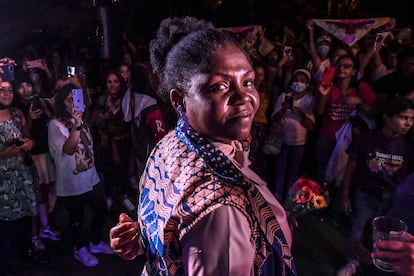Francia Márquez, the Colombian electoral phenomenon
The environmental leader won more votes than the center candidate Sergio Fajardo without having held public office and with a campaign that began only three months ago


Following this unprecedented primary, Francia Márquez has done nothing but smile. Although she did not win the leftist coalition El Pacto Historico [Historic Pact]’s election, where Gustavo Petro swept the board as expected, in her campaign headquarters it has been all celebration: “The people do not give up, damn it”, they sing and dance to a chorus that was sung during the social protests of 2021 and has made her well known. It is no wonder the environmentalist leader has become a Colombian electoral phenomenon.
With almost 97% of the ballot counted, Márquez obtained 757,000 votes and became the third-place candidate, behind Gustavo Petro and Federico Gutiérrez, on the right. Márquez not only surpassed the number of votes for three times presidential candidate and former mayor of Medellín Sergio Fajardo (who obtained 701,000 in the center election), and left behind well-known politicians such as the former minister Alejandro Gaviria and the former governor of Boyaca Carlos Amaya, but she also managed to grow a campaign in just three months without being a recognized figure in the country as a whole.
With her candidacy, Márquez has been the women’s representative in elections that lack female pre-candidates, with the exception of Ingrid Betancourt, who is running outside the coalitions. The social leader has put central issues and debates on the public agenda such as women’s economic inequality and the decriminalization of abortion, which she openly supports. She has been recognized by Ángela María Robledo, renowned feminist and former vice-presidential candidate on Petro’s 2018 ticket: “Adelante mujer valiente,” or go forward, brave woman, wrote Robledo.
Born 40 years ago in La Toma, a village of Afro-descendants in Cauca, Márquez denounced the illegal gold mining that was putting a multitude of inhabitants at risk of displacement by wiping out the Ovejas River, which provides a livelihood for 250,000 people in her community. She organized 80 local women and walked with them for 10 days and 350 kilometers to Bogotá. She staged a resistance march to Colombia’s parliament to make her voice heard and won the 2018 Goldman Environmental Prize, known as the environmental Nobel.
Márquez has now achieved national success with her movement ‘Soy porque Somos’ (or, I am because we are). Although she got 15% of left coalition votes, where the undisputed winner was Gustavo Petro with 80% (4.3 million votes), she knew how to grow her support in a short time. In fact, at least half of her votes were won in Bogotá. “We greet this great step with joy. The vote we have obtained has been very significant for the challenge we have, to achieve a project of change and transformation that puts life at the center. I acknowledge the nobodies, the nobodies of Colombia, those from the mountains, plains and neighborhoods of this country who accompanied us,” she said on the stage next to Gustavo Petro.
Márquez, who is a law student and farmer, joined Historical Pact, where they had publicly committed to give the second place candidate the opening to join Petro as vice president, however in the last days of the campaign spokespersons said that they would opt for another candidate for vice president in order to bring liberal sectors closer. Strong and straightforward, Márquez had already rebuked Petro when he did not include Afro-Colombian candidates at the top of the congressional lists. Petro admitted it but did not change his decision: “Francia Márquez is absolutely right in her claim. The electoral college of Historical Pact overwrote the ethnic line. It did it because of internal contradictions of the parties, but it subordinated a general principle: the inclusion of Colombia’s ethnic diversity.”
The high number of votes for this environmental leader sends a message in a country where social activist leaders are murdered every day. Colombia is, in fact, one of the most dangerous countries for land and environment defenders. Francia Márquez is among those defenders.
With Márquez in second place, it remains to be seen if Petro keeps his word and in the process reestablishes relations with feminists, one of the leftist candidate’s weakest flanks. Regardless of what Petro decides, Francia Márquez has been installed as the political surprise of a country that has been repeating the same names for years.
Tu suscripción se está usando en otro dispositivo
¿Quieres añadir otro usuario a tu suscripción?
Si continúas leyendo en este dispositivo, no se podrá leer en el otro.
FlechaTu suscripción se está usando en otro dispositivo y solo puedes acceder a EL PAÍS desde un dispositivo a la vez.
Si quieres compartir tu cuenta, cambia tu suscripción a la modalidad Premium, así podrás añadir otro usuario. Cada uno accederá con su propia cuenta de email, lo que os permitirá personalizar vuestra experiencia en EL PAÍS.
¿Tienes una suscripción de empresa? Accede aquí para contratar más cuentas.
En el caso de no saber quién está usando tu cuenta, te recomendamos cambiar tu contraseña aquí.
Si decides continuar compartiendo tu cuenta, este mensaje se mostrará en tu dispositivo y en el de la otra persona que está usando tu cuenta de forma indefinida, afectando a tu experiencia de lectura. Puedes consultar aquí los términos y condiciones de la suscripción digital.








































